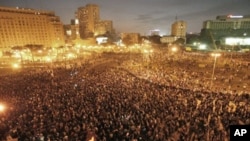Egyptian police fired tear gas and beat anti-government protesters to clear thousands of people from a central Cairo square Wednesday, after the largest demonstrations in years against President Hosni Mubarak's decades-old rule.
Three people were reported to have died in the nationwide unrest inspired by Tunisia's uprising. Two protesters were killed during a demonstration in the port city of Suez while a police officer died from injuries sustained during the protests in Cairo.
Waves of rock-throwing demonstrators occupied Cairo's Tahrir Square for hours Tuesday, beating back attempts to dislodge them by police wielding tear gas and water cannons. Several thousand people demonstrated in Alexandria, and there were reports of large protests in other cities including Mansoura and Mahalla al-Kobra.
Tuesday's demonstrations began peacefully, with police at first showing restraint. Several people said the clashes began in Cairo after protesters attempted to take control of a water cannon truck.
Such a coordinated wave of anti-government protests has not been seen in Egypt since Mr. Mubarak took power in 1981 after former President Anwar Sadat was assassinated by Islamists.
Egyptians Tuesday called for political and economic reforms in rallies inspired by demonstrations in Tunisia that led to the ouster of that country's president earlier this month. The unrest took place despite government warnings that demonstrators could be arrested.
The protests were promoted online by groups saying they speak for young Egyptians frustrated with the kind of poverty and oppression that triggered Tunisia's unrest.
Activists from Egypt's Kifaya (Enough) movement - a coalition of government opponents - and the 6th of April Youth Movement organized the protests on the Facebook and Twitter social networking websites. Western news reports said Twitter appeared to be blocked in Egypt later Tuesday.
Legal parties such as the liberal Wafd, as well as the banned Muslim Brotherhood - Egypt's largest and best organized opposition group - did not formally endorse the demonstrations, but a number of their members took part.
U.S. Secretary of State Hillary Clinton said Tuesday that Washington supports the "fundamental right of expression and assembly," but she urged Egyptians to refrain from violence.
Emergency laws in place since 1981 outlaw demonstrations without prior permission. Opposition groups said they were denied such permits for Tuesday's rallies, planned to coincide with a national holiday honoring the police, a key force in keeping President Mubarak in power.
Since Tunisia's anti-government protests, at least five Egyptians have attempted suicide by self-immolation, imitating the young Tunisian whose burning death in December 1 galvanized protesters there.
Egypt Police Disperse Anti-Mubarak Protesters















